Spoken Corpus Comes to Life - IELTS Reading Answers
13 min read
Updated On
-
Copy link
Boost your reading score by using the ‘Spoken Corpus Comes to Life’ IELTS reading passage and its answer key. Also, learn how to deal with different IELTS reading questions with tips to refine your reading strategy and achieve your desired reading score.
Table of Contents

Limited-Time Offer : Access a FREE 10-Day IELTS Study Plan!
Engaging with lengthy texts for a full sixty minutes without interruption can prove to be quite draining for most IELTS candidates. The best solution to this problem is the consistent practice of single passages like ‘Spoken Corpus Comes to Life IELTS Reading Answers’. This helps you to cultivate enhanced endurance slowly and effectively. Once you handle one passage confidently, you can progress to other IELTS Reading topics for General and Academic and eventually to full-length tests without burnout or frustration.
Solve the questions with the passage, ‘Spoken Corpus Comes to Life Reading Answers’, check your answers against the provided location and explanations, and go through the tips to improve your performance in the reading module.
Passage for Spoken Corpus Comes to Life IELTS Reading Answers
Given below is the ‘Spoken Corpus Comes to Life' passage that you can go through and prepare yourself for the IELTS Academic Reading section.
You should spend about 20 minutes on Questions 1-12, which are based on the Reading Passage below.
Spoken Corpus Comes to Life
A The compiling of dictionaries has been historically the provenance of studious professorial types - usually bespectacled - who love to pore over weighty tomes and make pronouncements on the finer nuances of meaning. They were probably good at crosswords and definitely knew a lot of words, but the image was always rather dry and dusty. The latest technology, and simple technology at that, is revolutionising the content of dictionaries and the way they are put together.
B For the first time, dictionary publishers are incorporating real, spoken English into their data. It gives lexicographers (people who write dictionaries) access to a more vibrant, up-to-date vernacular language which has never really been studied before. In one project, 150 volunteers each agreed to discreetly tie a Walkman recorder to their waist and leave it running for anything up to two weeks. Every conversation they had was recorded. When the data was collected, the length of tapes was 35 times the depth of the Atlantic Ocean. Teams of audio typists transcribed the tapes to produce a computerised database of ten million words.
C This has been the basis - along with an existing written corpus - for the Language Activator dictionary, described by lexicographer Professor Randolph Quirk as “the book the world has been waiting for”. It shows advanced foreign learners of English how the language is really used. In the dictionary, key words such as “eat” are followed by related phrases such as “wolf down” or “be a picky eater”, allowing the student to choose the appropriate phrase.
D “This kind of research would be impossible without computers,” said Delia Summers, a director of dictionaries. “It has transformed the way lexicographers work. If you look at the word “like”, you may intuitively think that the first and most frequent meaning is the verb, as in “I like swimming”. It is not. It is the preposition, as in: “she walked like a duck”. Just because a word or phrase is used doesn’t mean it ends up in a dictionary. The sifting out process is as vital as ever. But the database does allow lexicographers to search for a word and find out how frequently it is used - something that could only be guessed at intuitively before.
E Researchers have found that written English works in a very different way to spoken English. The phrase “say what you like” literally means “feel free to say anything you want”, but in reality it is used, evidence shows, by someone to prevent the other person voicing disagreement. The phrase “it”s a question of crops up on the database over and over again. It has nothing to do with enquiry, but it’s one of the most frequent English phrases which has never been in a language learner’s dictionary before: it is now.
F The Spoken Corpus computer shows how inventive and humorous people are when they are using language by twisting familiar phrases for effect. It also reveals the power of the pauses and noises we use to play for time, convey emotion, doubt and irony.
G For the moment, those benefiting most from the Spoken Corpus are foreign learners. “Computers allow lexicographers to search quickly through more examples of real English,” said Professor Geoffrey Leech of Lancaster University. “They allow dictionaries to be more accurate and give a feel for how language is being used.” The Spoken Corpus is part of the larger British National Corpus, an initiative carried out by several groups involved in the production of language learning materials: publishers, universities and the British Library.
Discover fast strategies to master such passages in under 20 minutes.
Join our FREE IELTS webinars!
Questions for Spoken Corpus Comes to Life Reading Answers
The academic passage, Spoken Corpus Comes to Life from Cambridge 1 Test 3, consists of 12 questions. It presents three different IELTS Reading question types with examples. The question types in this reading passage include:
- IELTS Reading Matching Headings (Q. 1-6)
- IELTS Reading Diagram Completion (Q. 7-11)
- IELTS Reading Multiple Choice Questions (Q. 12)
Questions 1-6
The Reading Passage has seven paragraphs (A-G).
Choose the most suitable heading for each paragraph from the list of headings below. Write the appropriate numbers (i-xi) in boxes 1-6 on your answer sheet.
Paragraph C has been done for you as an example.
NB There are more headings than paragraphs, so you will not use all of them. You may use any heading more than once.
|
Example: Paragraph C Answer: xi |
List of Headings
i Grammar is corrected
ii New method of research
iii Technology learns from dictionaries
iv Non-verbal content
v The first study of spoken language
vi Traditional lexicographical methods
vii Written English tells the truth
viii New phrases enter dictionary
ix A cooperative research project
x Accurate word frequency counts
xi Alternative expressions provided
1 Paragraph A
2 Paragraph B
3 Paragraph D
4 Paragraph E
5 Paragraph F
6 Paragraph G
Questions 7-11
The diagram below illustrates the information provided in paragraphs B-F of the reading passage.
Complete the labels on the diagram with an appropriate word or words.
Use NO MORE THAN THREE WORDS for each space.
Write your answers in boxes 7-11 on your answer sheet.
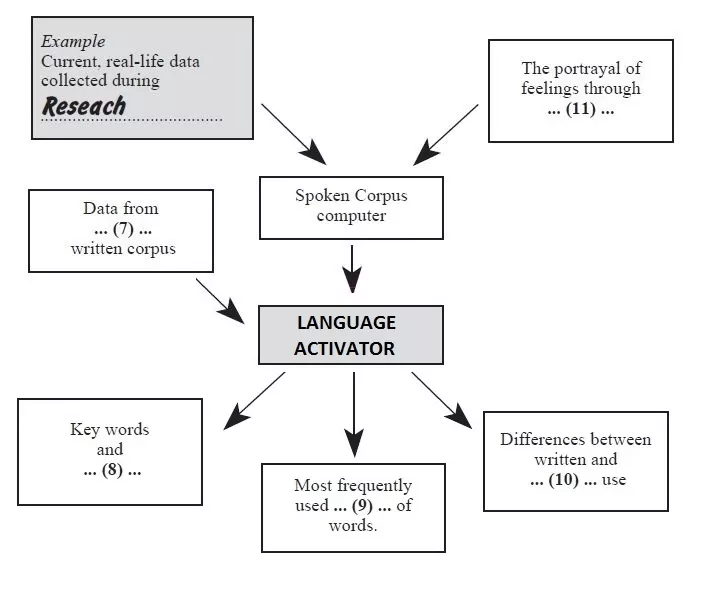
7 …………
8 …………
9 …………
10 …………
11 …………
Questions 12
Choose the appropriate letter A-D and write it in box 12 on your answer sheet.
12 Why was this article written?
A To give an example of a current dictionary.
B To announce a new approach to dictionary writing.
C To show how dictionaries have progressed over the years.
D To compare the content of different dictionaries
Answers and Explanations of Spoken Corpus Comes to Life IELTS Reading Passage
Check out the detailed explanations for the Spoken Corpus Comes to Life reading passage questions given above to improve your reading skills for a top IELTS band score.
1 Answer: vi
Question type: Matching Headings
Answer location: Paragraph A, lines 1-2
Answer explanation: The answer is clearly mentioned in the said paragraph and line. The ‘compiling of dictionaries’ which is called lexicography has been ‘historically’ or traditionally been the work of people who are ‘studious professorial types’ and ‘love to pore over weighty tomes and make pronouncements on the finer nuances of meaning’. This is different from the latest way of doing it. Hence, the answer is vi (Traditional lexicographical methods).
2 Answer:ii
Question type: Matching Headings
Answer location: Whole of paragraph B
Answer explanation: In paragraph B, it is specified that following the latest technology, for the first time, dictionary publishers are incorporating real, spoken English into their data. It gives lexicographers access to a more vibrant, up-to-date vernacular language’ which has never really been studied before. A new method that was followed in one project was that 150 volunteers each agreed to discreetly tie a Walkman recorder to their waist and leave it running for anything up to two weeks. Every conversation they had was recorded. When the data was collected, the length of tapes was 35 times the depth of the Atlantic Ocean. Teams of audio typists transcribed the tapes to produce a computerised database of ten million words. Hence, the answer is ii (New method of research).
3 Answer:x
Question type: Matching Headings
Answer location: Paragraph D, lines 6-7
Answer explanation: The answer is clearly mentioned in the said paragraph and line. The ‘sifting out process is as vital’ but the database does allow lexicographers to search for a word and find out ‘how frequently it is used’, that is, the word frequency. Hence, the answer is x (Accurate word frequency counts).
4 Answer:viii
Question type: Matching Headings
Answer location: Paragraph E line 4
Answer explanation: The said paragraph points out that phrases like ‘it’s a question of crops up on the database over and over again’ is one of the most frequent English phrases which has ‘never been in a language learner’s dictionary before: it is now’. This means that now different new phrases are being entered into the dictionary. Hence, the answer is viii.
5 Answer:iv
Question type: Matching Headings
Answer location: Paragraph F, line 2
Answer explanation: The said portion informs that the Spoken Corpus computer shows how non verbal content like ‘pauses and noises’ that we use to play for time, convey emotion, doubt and irony are powerful. Hence, the answer is iv.
6 Answer: ix
Question type: Matching Headings
Answer location: Paragraph G, line 4
Answer explanation: In paragraph G, the writer adds that the Spoken Corpus is part of the larger British National Corpus, an initiative carried out by several groups’, which means it is a cooperative project, and involved in the production of language learning materials through research. Hence, the answer is ix (A cooperative research project).
7 Answer: existing
Question type: Diagram Completion
Answer location: Paragraph C line 1
Answer explanation: In the Paragraph C, the writer says that the computerized database, discussed in the previous paragraph, has been the basis – ‘along with an existing written corpus’ for the Language Activator dictionary, described by lexicographer Professor Randolph Quirk as “the book the world has been waiting for”. Hence, the answer is ‘existing’.
8 Answer: (related) phrases
Question type: Diagram Completion
Answer location: Paragraph C, line 3
Answer explanation: The said portion points out that the Language Activator dictionary shows advanced foreign learners of English how the language is really used. In the dictionary, ‘key words such as “eat”’ are followed by ‘related phrases such as “wolf down” or “be a picky eater”’, allowing the student to choose the appropriate phrase. Hence, the answer is ‘(related) phrases’.
9 Answer: meaning/form
Question type: Diagram Completion
Answer location: Paragraph D, lines 3-6
Answer explanation: Paragraph D refers to the fact that if you look at the word “like”, you may intuitively think that the first and ‘most frequent’ (frequently used) ‘meaning’ (of words) is the verb, as in “I like swimming”. But, in reality, it is the preposition, as in: “she walked like a duck”. So, just because ‘a word or phrase’ which may also be called form is used doesn’t mean it ends up in a dictionary. Hence, the answer is ‘meaning/form’.
10 Answer: speaking/oral
Question type: Diagram Completion
Answer location: Paragraph E, line 1
Answer explanation: Paragraph E tells that researchers have found that ‘written English’ ‘works in a very different way’ (difference) to ‘spoken English’ (oral). Some examples are also given to prove this point. Hence, the answer is ‘speaking/oral’.
11 Answer: noise and pauses
Question type: Diagram Completion
Answer location: Paragraph F, lines 1 & 2
Answer explanation: The mentioned portion informs that the Spoken Corpus computer shows how inventive and humorous people use language by twisting familiar phrases for effect, or pauses and noises which we use to play for time to ‘convey emotion’ or for portrayal of feelings. Hence, the answer is ‘noise and pauses’.
12 Answer: B
Question type: Multiple Choice Questions
Answer location: whole passage
Answer explanation: In the passage, there is no comparison between the content of dictionaries. As a result, option D cannot be the answer. There is a mention of the Spoken Corpus as part of a larger initiative for production of language learning material. But this does not point out about an example of a current dictionary as mentioned in option A. Further, in paragraph A, it is given that ‘compiling of dictionaries has been historically the provenance of studious professorial types’ and the ‘latest technology’ is revolutionising the content of dictionaries and the way they are put together. Although there is a short mention of the past and present of dictionaries, the progression of dictionaries over the years has not been explained. Finally, paragraph B discusses that for the first time, ‘dictionary publishers are incorporating real, spoken English into their data’ (announce a new approach to dictionary writing). It gives lexicographers access to a more vibrant, up-to-date vernacular language which has never really been studied before.Hence, the answer is B.
Learn quick solving tips and reading techniques from experts!
Connect with us through our FREE IELTS online classes!
How to Solve the Question Types in the Spoken Corpus Comes to Life Reading Passage?
Let’s check out some IELTS exam preparation tips for achieving a band score of 8+ for each question type in the Spoken Corpus Comes to Life Reading Answers.
Matching Headings
- Read the list of headings before reading the passage: Underline keywords in each heading (e.g. method, frequency, cooperative, non-verbal). This helps you recognise ideas quickly when you skim paragraphs.
- Read only the first and last two sentences of each paragraph: IELTS passages usually place the main idea at the beginning or end of a paragraph. Do not read line by line unless two headings seem very similar.
- Identify the paragraph’s focus, not its examples: Ignore supporting details and examples (like specific words or projects). Ask yourself: What is this paragraph mainly about?
- Match ideas, not identical words: Headings are paraphrased versions of paragraph ideas. For example, ‘accurate word frequency counts’ may appear as ‘how frequently a word is used’.
- Use elimination for close options: Cross out headings that clearly do not match the paragraph’s theme. This is especially useful because there are more headings than paragraphs.
- Re-check using the “one-sentence summary test”: Summarise the paragraph in one sentence and compare it to the heading. If they express the same idea, the match is correct.
Diagram Completion
- Read the diagram labels carefully before scanning the text: Understand what each blank represents (e.g. source, process, outcome). This prevents copying irrelevant words from the passage.
- Locate the exact paragraph range mentioned: The question tells you the answers come from paragraphs B–F, so ignore the rest of the passage. This narrows your search and saves time.
- Scan for nouns and noun phrases: Diagram answers are usually objects, processes, or concepts, not verbs. Focus on technical or descriptive noun phrases in the text.
- Copy words exactly as they appear: Do not paraphrase or change word forms. IELTS examiners only accept answers taken directly from the passage.
- Check the word limit strictly: Count the words after writing each answer. Even a correct answer will be marked wrong if it exceeds three words.
Multiple Choice Question
- Read the question before re-reading the passage: Knowing you are looking for the writer’s purpose helps you read globally instead of focusing on details.
- Identify the main theme repeated across paragraphs: Look for ideas that appear throughout the text, not just in one paragraph. Repeated emphasis usually reveals the author’s intention.
- Eliminate options that are too narrow: Options that focus on one example, one dictionary, or one time period are usually wrong. IELTS purpose questions require a broad answer.
- Choose the option that explains why the article exists: The correct answer explains the motivation behind writing the article (e.g. introducing a new approach), not just what it contains.
To conclude, completing the reading passage ‘Spoken Corpus Comes to Life’ can help you be IELTS-ready and improve your comprehension skills. To attain a high score on IELTS Reading, keep solving more IELTS Reading practice tests and work on your reading skill set.
Useful Links:
Practice IELTS Reading based on question types

Start Preparing for IELTS: Get Your 10-Day Study Plan Today!
Explore other Reading Actual Tests
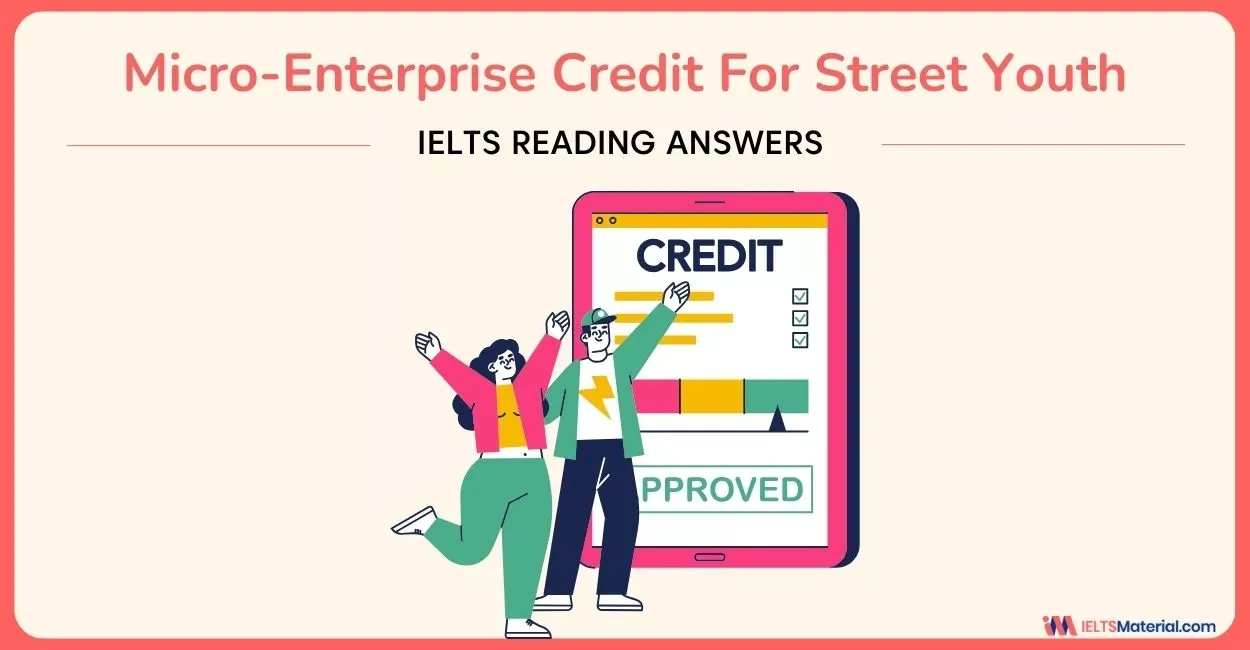
Kasturika Samanta
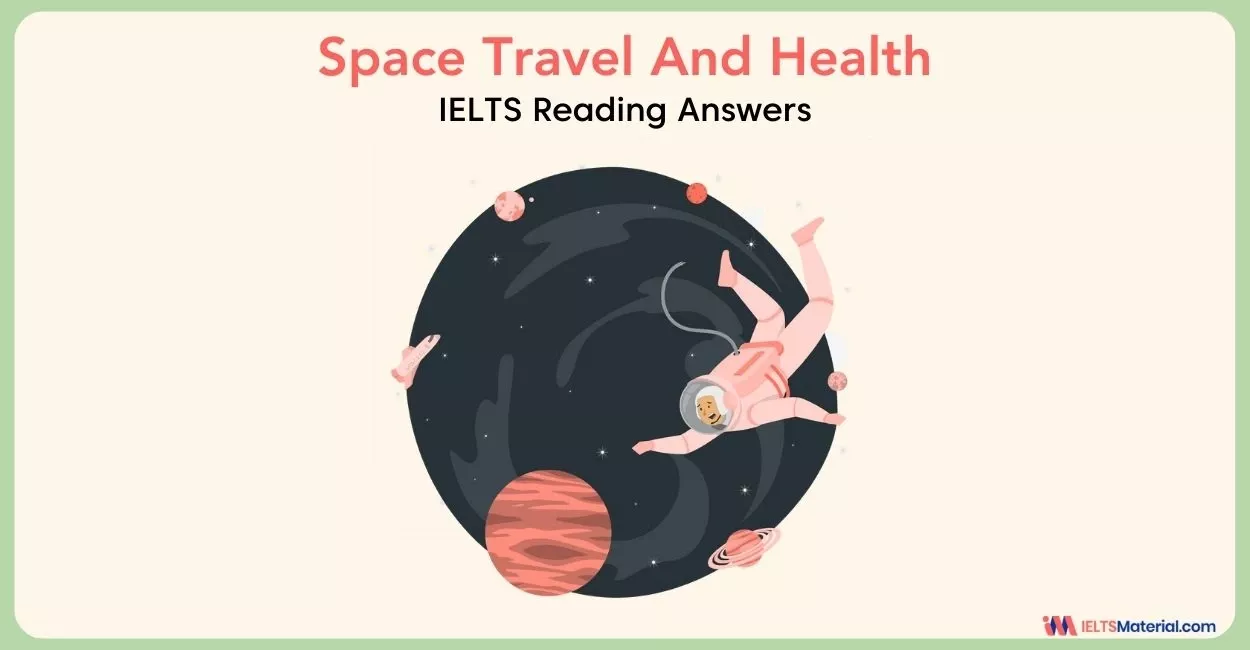
Kasturika Samanta
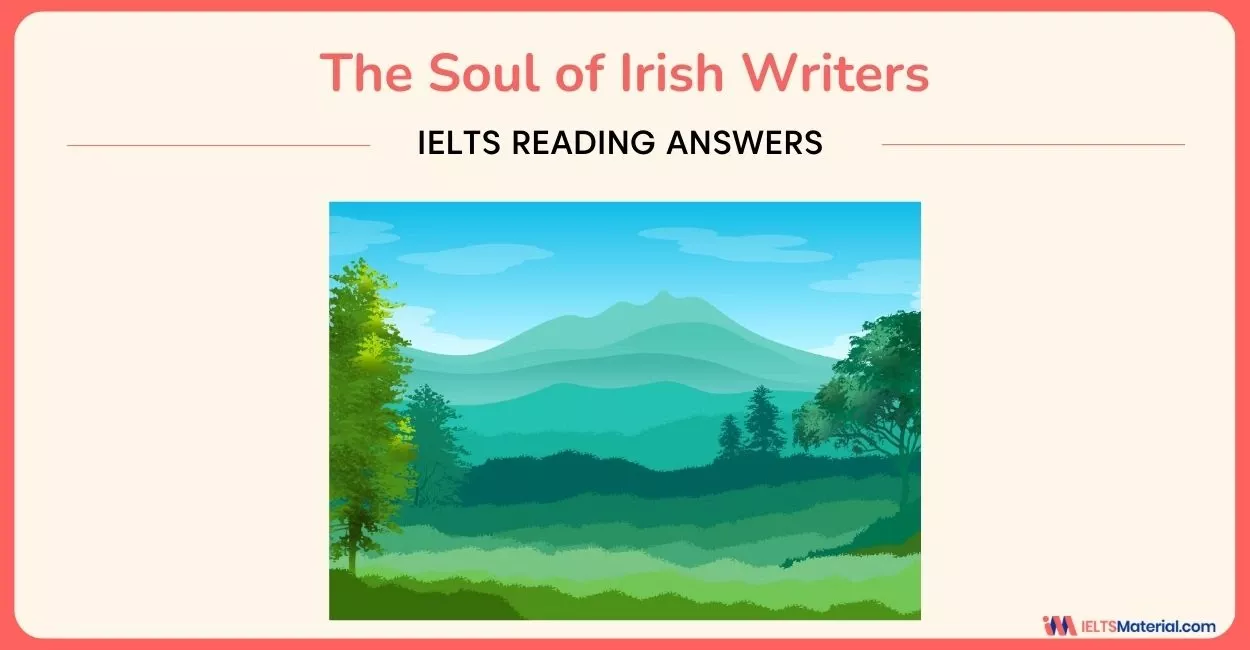
Kasturika Samanta
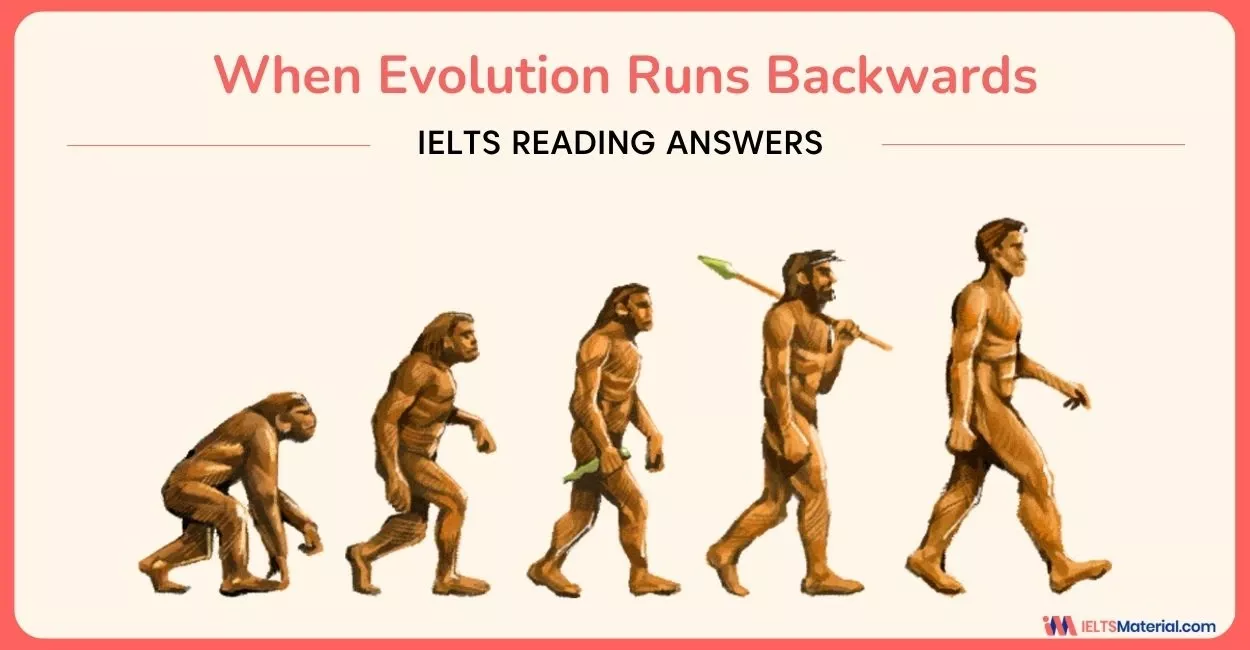
Kasturika Samanta
Recent Articles

Nehasri Ravishenbagam

Haniya Yashfeen

Haniya Yashfeen

Haniya Yashfeen
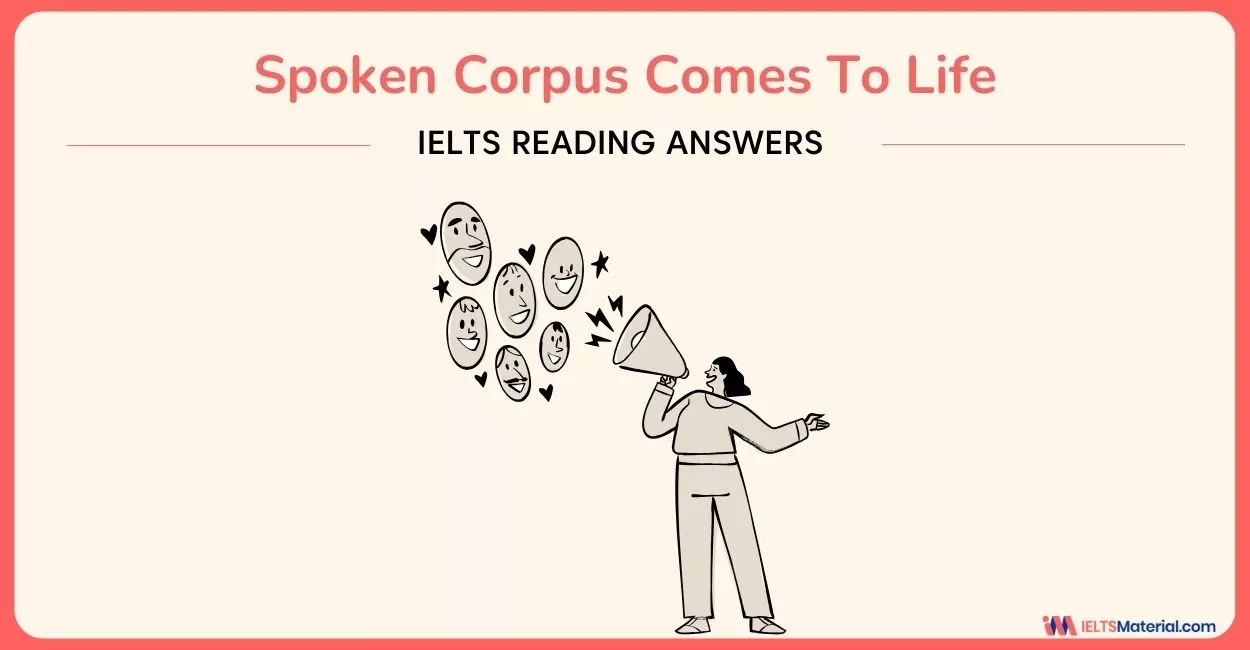



Post your Comments